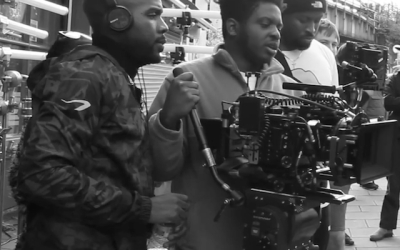The Cannes Lions Festival of Creativity was found 70 years ago by cinema advertisers – but these days you’re more likely to find execs from Google, Amazon, TikTok and Microsoft strolling along the Mediterranean seafront with delegate badges. While the event is still centred around brands and agencies, it has also become a showcase of digital craft and a hot bed of discussion about tech trends – from AI to Haptics.
The Drop was on the ground in Cannes this week and had insider access to both the awards programme and the conference programme. So here’s a brief round-up of some of the digital-led talking points that caught our eye during the event:
ChatGPT: OpenAI’s chatbot was always going to be a top talking point in Cannes, so it was no surprise to see the company’s conference session packed out. OpenAI COO Brad Lightcap addressed concerns about job losses by insisting ChatGPT and sister product DALL-E are collaborative tools that will enhance productivity and “supercharge creativity”. Describing AI as a thought partner, he said improvements are being made that will allow ChatGPT to align more closely with local cultures and users. Lightcap is currently on a global tour to see how users are working with the tech, talking to a range of communities including creatives and entrepreneurs.
Snapchat: Snapchat had a high-profile at Cannes Lions, showcasing its tools and participating in the awards judging process. On the former front, it joined forces with Disney to celebrating ‘Disney100’ through an immersive exhibition designed to show how Augmented Reality can enhance storytelling and bring to life characters. Using Snapchat’s AR technology, delegates could engage with elements of Guardians of the Galaxy, Elemental, Avatar: The Way of Water, and The Mandalorian. Jessica Intihar, SVP, digital marketing, Walt Disney Studios, said Snapchat’s technology “continues to open up new ways to experience and engage with our stories.”
Meanwhile, Resh Sidhu, global director of Snap Inc’s Arcadia Creative Studio, was Jury President of the Digital Craft Awards category. Across the category’s 600+ entries, Sidhu said AI/machine learning and ChatGPT were prevalent, “but we quickly realised that tech alone is not enough. It needs to be tech with purpose.” Sidhu’s jury awarded the top prize, the Digital Craft Grand Prix, to Never Done Evolving, an AKQA campaign for Nike that is based around tennis star Serena Williams. This entry used AI and data analytics to deconstruct Serena’s stunning career. One clever stunt saw an AI-generated match between 1999 Serena and a more mature 2017 Serena. A YouTube livestream of the event reached over 1.69 million Nike subscribers.
TikTok: The short-form platform’s high-profile presence at Cannes Lions this year was a powerful indicator of the importance advertising is likely to play in the company’s future. Day one saw a session in the Grand Palais led by TikTok global head of business, marketing, Sofia Hernandez, and Ulta Beauty CMO Michelle Crossan-Matos. The goal of the session was to pitch the notion of ‘community commerce’ where culture, entertainment, and shopping blend to create a seamless journey from product discovery to purchase. Hernandez attempted to demonstrate how brands can connect with the TikTok community authentically and impactfully, fuelling discovery and recommendations, while creating an engaging and entertaining experience.
“From creating attention-grabbing hooks to delivering content with an entertaining narrative, TikTok has all the tools and techniques necessary to simply and easily craft a persuasive story that sells. From easy-to-use video editing functions and platforms to make the entire creative production process simple, to tapping into leading creative experts and partners, we help brands fully embrace creativity and communities as a way to drive performance and drive real impact,” said Hernandez.
Hernandez’s curtain-raiser was supported by sessions across the week at The Carlton Hotel involving a wide array of influential agencies, brands and creators. TikTok also made its mark in the Cannes Lions awards programme, winning a Gold Lion in Entertainment Lions for Music category. The successful entry was the Rosalia Motomami Live Experience on TikTok, which took place in March 2023.
Will.i.am/FYI: The rock star turned entrepreneur was another of Cannes Lions’ massive attractions. A huge advocate of AI’s ability to support creators, he predicts it will be a democratising force that will benefit “underserved communities”. A key reason for his arrival in Cannes is that he is launching a new tech platform for creatives called FYI. Backed by IBM, FYI will be a way for artists/creatives to centralise all data in one place – secured through the use of encryption. Every piece of data connected to a project, from original IP to confidential conversations, would be stored in the same place – to save artists having to use disparate platforms. He also demonstrated an integrated AI functionality – getting FYI’s in-built AI tool to rewrite Where Is The Love? and then adapt it as a play – all while sitting on stage playing with his mobile phone.
Virtual influencers: Online talents prefer to be described as creators rather than influencers these days. But it’s not clear if the growing ranks of virtual influencers feel the same way. Thursday morning at Cannes Lions saw a session hosted by Dentsu Creative and CapitaLand which explored the rise of virtual influencers in Asia. During the session, the panel talked to Rae, a virtual influencer that has grown a fanbase of 1.1 million in just two years. The session provided a deep dive into Rae’s world and explored why virtual influencers have emerged as a trend. One of the key takeaways was that they can present brands with a rare opportunity to engage online consumers, while maintaining total control. If all of this seems to be one of those uniquely Asian trends, then it’s worth noting that Gen Z across borders is buying into virtual influencers in a big way. And brands like Balmain and Marks & Spencer are already experimenting. That’s no real surprise when you think of virtual influencers as just being a zeitgeisty variant on gaming avatars or animated characters.
Whalar: One question that Cannes Lions poses is whether there is room for digital-first content creators in the traditional world of brands and agencies. Superficially, the answer seems to be yes – given that there is a Social & Influencer Award. But it’s noticeable that some of the best-performing work in this category comes from ad agencies. The fact that the award refers to influencers suggests that digital-first talent is still seen as being more about its onscreen appeal than its production prowess.
One session that sought to address this issue head on was: It’s not content creators OR adland creatives but BOTH, featuring Ashley Rudder, global chief creator officer of creator commerce company Whalar, and ad industry legend John Hegarty, now co-founder and creative director The Garage Soho & The Business of Creativity.
Hegarty told delegates that if he was starting out in the communications industry today he would “definitely start as a content creator. I would start to develop my own ideas, begin to build an audience, begin to have an influence and then take that influence in to companies and say I understand how to talk to people.”
Rudder noted that there has been some resistance to creators from the ad industry – but she sees a gradual change: “As we are seeing the lower effectiveness of TV ads and higher effectiveness of creative that’s come from creators, there’s a shift happening. If you can align and combine, then the evolution can be something really explosive and magical. And that playground is a lot more inclusive and welcoming.”
Gaming platforms: There’s been a lot of talk about Roblox as a proto-Metaverse, so it was intriguing to see VP new ecosystems and global partnerships Christina Wootton in Cannes to “decode Gen Z behaviour”. Her session featured five tips to “effectively engage with Gen Z in the Metaverse”. Also on the programme was an Activision Blizzard session entitled Call Of Duty: From Game to Cultural Phenomenon. Here, Johanna Faries, general manager of Call of Duty, stressed the power of community in building gaming brands, and the importance of staying reflective of popular culture. Watchwords for brands were authenticity and audience-centric decision-making.
One of the most interesting gaming cameos of the week was the Lions-winning work created for Clash Of Clans by Wieden + Kennedy. The decade old game wanted to create a closer connection with the community, so W+K came up with the brilliant idea of inventing a history for the game that stretched back to the 1980s. Fake founders, retro games, trading cards, a cereal and much more built a hilarious back story that today’s fans were only too happy to embrace. The meticulously-created campaign also involved a 20-minute documentary Clash From The Past, which told the fabricated origin story in detail. This generated more than 3m views on YouTube.





